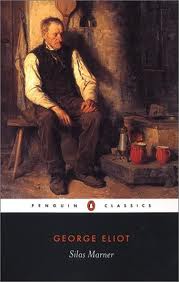Silas Marner by George Eliot
Reviewed by Ellen


Ratings Explanation
Adult Themes: Silas is accused of a theft he did not commit. Squire Cass has two dishonorable sons; one drinks and steals, and the other is secretly married to a woman he does not love who has an opium addiction. The men in town frequent the local pub (where amusing stories are told with a slightly tipsy narration). A dead body is discovered lying at the bottom of a pond.
Synopsis
In this classic tale, a kind, gentle linen weaver named Silas Marner is accused of a theft he did not commit. Framed by his best friend, who then steals his fiancee and ruins his reputation, Marner quietly leaves town and exiles himself to the tiny village of Raveloe, where his reclusive nature keeps him distanced from the other villagers. He absorbs himself in his weaving and counts his gold each night, his only comforts. In the same village live Squire Cass and his two sons, Dunstan and Godfrey, who have their own secrets to hide. Dunstan is a dissolute young man who spends his father’s money and drinks to excess; Godfrey, who pines for the lovely Nancy Lammeter, is secretly married to a woman far beneath him in social stature and feels trapped. Eventually, the lives and actions of the two Cass brothers become entwined in that of Silas Marner; Dunstan stumbles upon Silas’s unlocked cottage and steals his stash of gold coins. The theft profoundly affects Marner, who loses the only thing in life he loved or valued. Then one day an abandoned child inexplicably appears in his lonely cottage and reawakens inside him all that was missing from his life: joy, laughter, and love.
This is a beautiful tale of spiritual rebirth and redemption. I enjoyed watching Silas’s transformation from lonely recluse to doting father; I particularly enjoyed Mrs. Winthrop’s commentary on religion: “…there’s trouble i’ this world, and there’s things as we can niver make out the rights on. And all as we’ve got to do is to trusten, Master Marner–to do the right thing as fur as we know, and to trusten.” An interesting fact: George Eliot (the author) was actually a woman named Mary Ann Evans.






